The true SEO school. Course “SEO Fundamentals“. Lesson number three: What is the source of knowledge in SEO?
Hello, my friends. My name is Bohdan and I’m giving you the third lesson of course “SEO Fundamentals“. This one is called “What is the Source of Knowledge in SEO”. But before we delve deeper into, let’s recall what was the content of lesson number two. In lesson number two, we dealt with an SEO-specific perspective. So let’s summarize it.
Summary of the previous lesson
SEO combines three types of experimental data:
- pre-experiment,
- experiment setting on the website and
- post-experiment or a data feedback loop.
So, as a source of data, SEO fulfils the requirement of being comprehensive. It is a source of deep, transparent and coherent data.
Yet, data doesn’t equal knowledge. To become a knowledge data must pass a threefold test. It must be practical, coherent and just.
Practical is a thing that brings internal alignment or alignment between people within the organization. Internal alignment is built by melting SEO-specific and not-SEO specific knowledge.
Internal alignment is assured by acting as if stakeholders are (already) aligned, even if it’s unknown. Acting aligned must be beneficial to all versus acting on his / her own.
Now that’s clear, let’s jump to a question: What is the source of knowledge in SEO?
1. What is the difference between knowledge and opinion?
So first, what is the difference between knowledge and opinion? Opinions are not substantiated. Knowledge is something that is based on proof.
2. Two sources of knowledge
Knowledge comes from two sources:
- created by other people
- created by a person himself or herself.
3. Knowledge that comes from other people
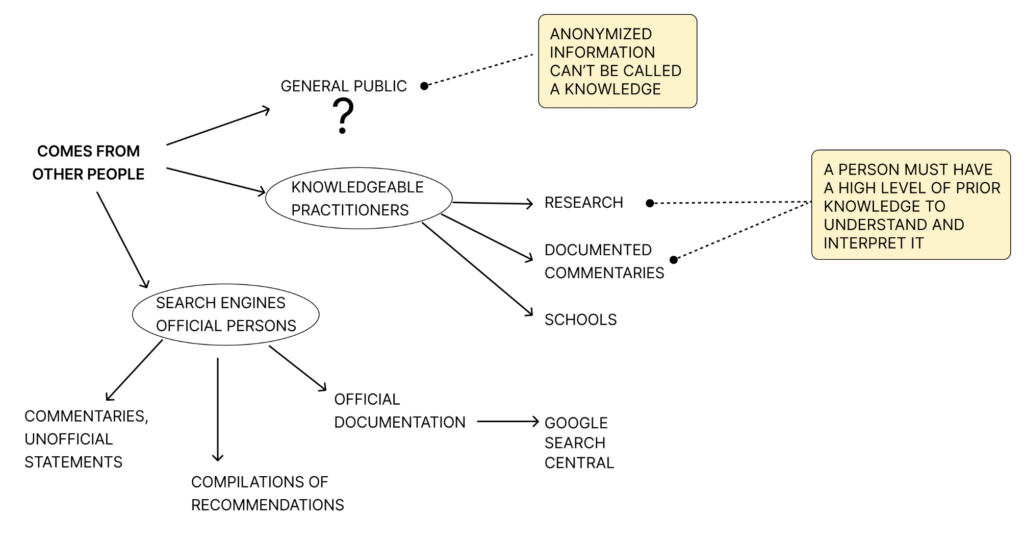
So far SEO is concerned, knowledge that comes from other people may come from:
- general public,
- knowledgeable practitioners or
- search engine officials.
Knowledge from the general public is not a knowledge
The general public is a very dubious source of knowledge. In effect, the general public doesn’t produce any type of knowledge because anonymised information cannot be called knowledge. So you always must attribute knowledge to a person.
Knowledge from practitioners is not transferable as it requires a prior knowledge
The practitioners who do research, documented commentaries and run schools – these are people who are producing knowledge. The problem with them is that a person must have a high level of prior knowledge in order to understand or interpret their knowledge.
This creates a very big problem with knowledge from practitioners and schools. To acquire it a person must already possess a deep prior understanding, which contradicts the principle of knowledge, i.e. knowledge must be transferable.
In the case of practitioners and schools, it’s very hard to transfer their knowledge without students having knowledge a priori.
Knowledge that comes from official sources of search engines
Knowledge that comes from official representatives of source engines. There are three things here:
- knowledge that comes from official documentation,
- compilation of recommendations and
- knowledge comes from commentaries or unofficial statements.
Official documentation is Google Search Central’s website, formerly known as Google Webmasters. The compilation of recommendations is, for example, Google
- best practices that he used to issue for e-commerce or different types of websites, or
- Google Quality Evaluator Guidelines,
- unofficial commentaries, e.g. blogs, Google Podcasts, unofficial statements of Google.
4. Mustn’t that who teaches know himself?
Let’s pose a question. Doesn’t the teacher know (something) himself? Obviously, to produce knowledge a person must know the subject himself.
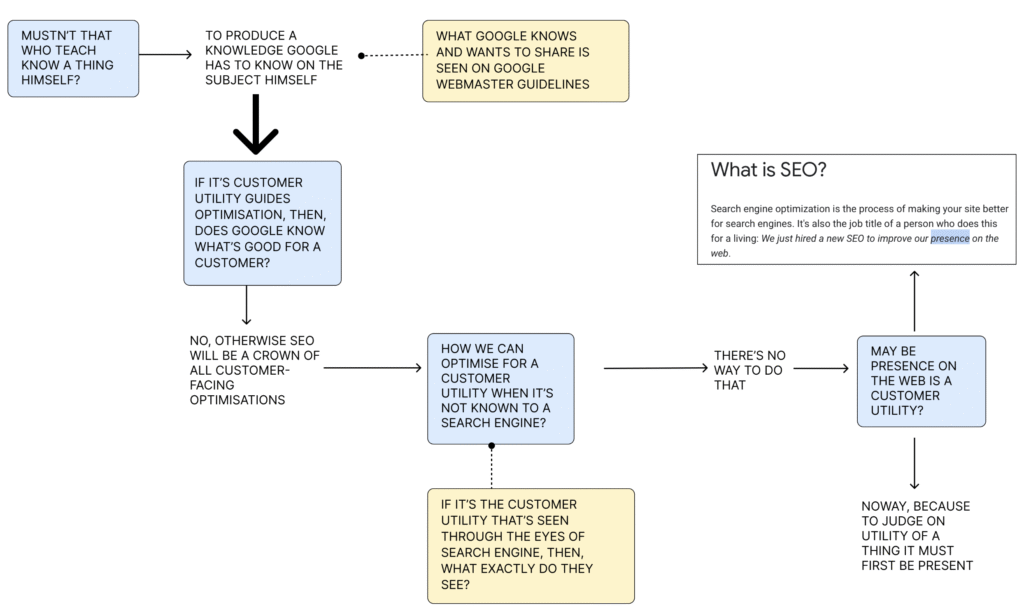
5. Does Google know what is good for customers?
Let’s ask the follow-up question. If it’s a customer utility that guides optimization, then does Google know what is good for customers? What is the customer utility?
No, in effect, Google doesn’t know it. It doesn’t even pretend to know it. Otherwise, SEO would be the “crown” of all customer facing optimisations.
6. How can we optimise for a customer utility if it’s unknown for a search engine?
Let’s put it another way, if it’s the customer utility that’s seen through the eyes of search engines, then what exactly do these eyes see? The answer is that there’s no way to tell. There’s no way to optimise for customer utility through the lens of search engines when it’s unknown to search engines. They can only infer it using algorithms and mathematical operations from customer feedback.
Like Google claims in its official statement that search optimization is the process of making your site better for search engines, and we hire SEO to improve our presence on the web.
7. So, maybe a [mere] presence on the web is a customer utility?
No, because to judge on a utility of something, that something must be already present. So let’s pause here and go to the other branch of discussion, which is the knowledge that comes from the person himself or herself.
8. Another source of knowledge is the person’s self
Let’s ask another question.
How can a person acquire this knowledge?
The person can require knowledge here – like in every other domain – by asking questions. By making a hypothesis, making research, substantiating or refuting a hypothesis.
Where a person willing to acquire knowledge shall start from?
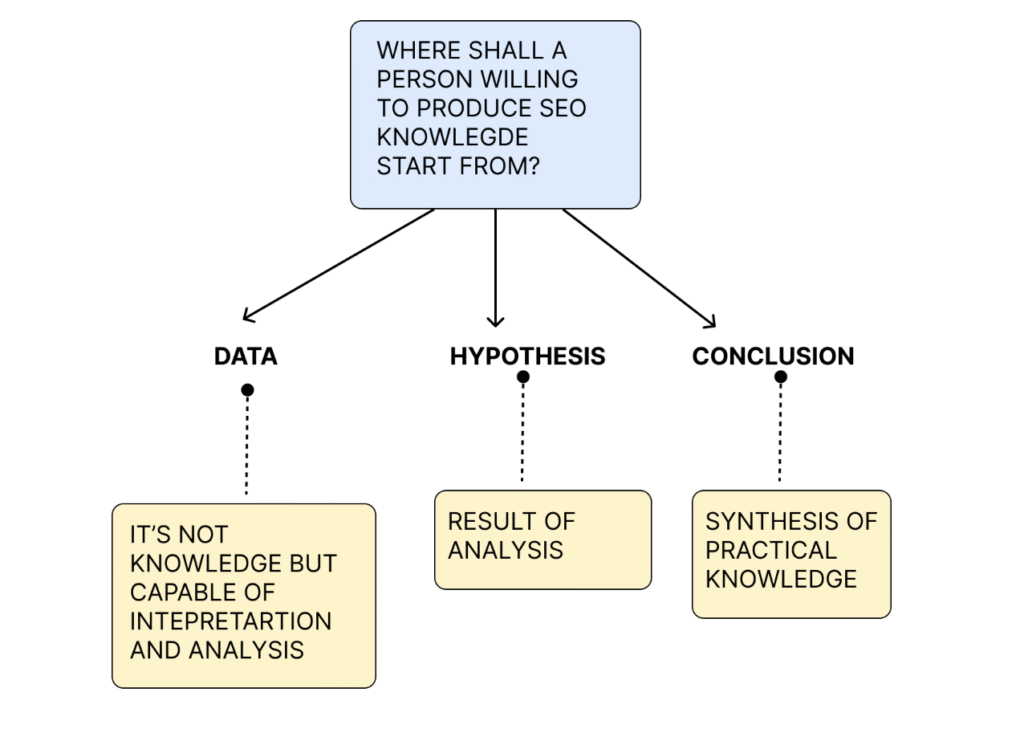
This person must:
- start from data,
- proceed to hypothesis, and then
- make a conclusion
Data, that is not knowledge, but it’s capable of interpretation and analysis.
Hypothesis is a result of analysis and
Conclusion is a synthesis or a practical knowledge.
9. What are the conditions that are required to produce knowledge?
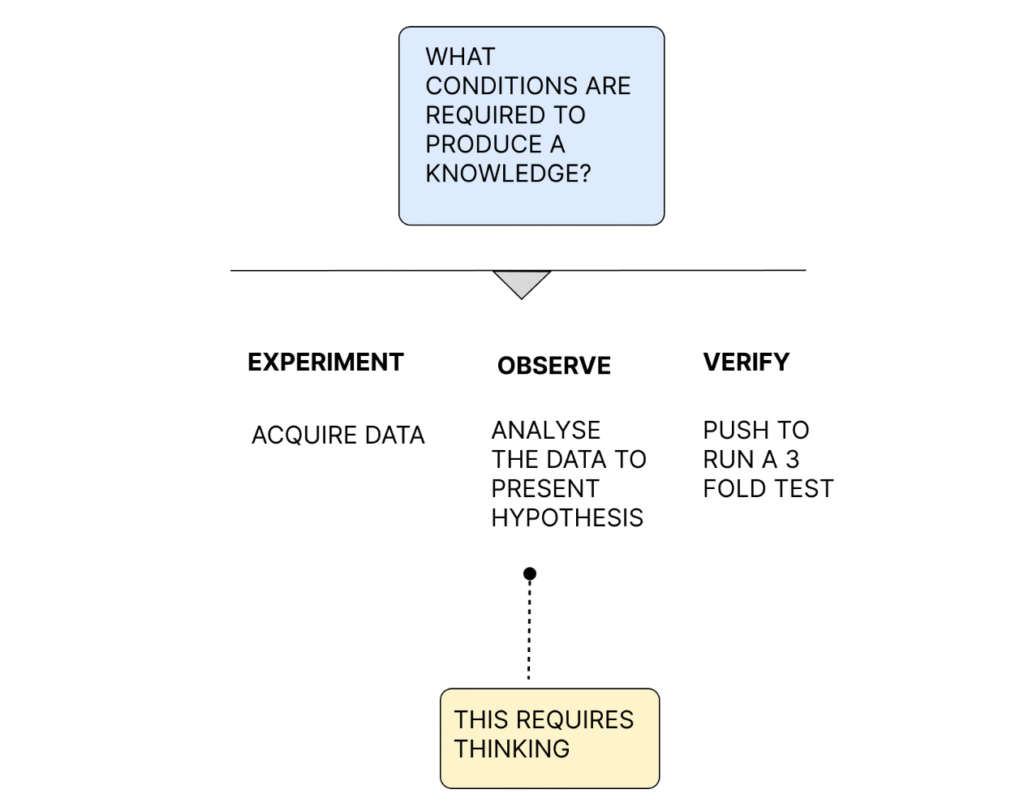
In the SEO setting, these are conditions of experiment or something that will produce the data. Let’s call an “experiment” a setting especially made to produce some data.
Then its observation. Once produced, the data must be analysed to present or advance a hypothesis.
And finally, it’s a verification stage. The knowledge must be put to a threefold test. This is to say: to test if it’s practical, just and coherent. And above it all, to produce knowledge requires thinking.
Summary
Well, let’s summarize.
First, it’s necessary to discern opinion from knowledge in SEO. Knowledge comes from two sources: it’s either other people or a person himself or herself.
Google doesn’t know what is good for customers, so Google can’t teach optimisation. And knowledge may only be created by a person internally, by himself.
To acquire knowledge, a person needs data and needs an ability to make a hypothesis from this data.
SEO. A faculty of thinking, i.e. ability to discern and interrogate is a prerequisite of acquiring the knowledge in SEO.
Postback from Lesson 20
Scientific thinking is the only true source of knowledge in SEO. In so far as SEO is an optimisation function that aims to improve the base processes and their outcomes, it can’t take anything as given or outsource acquisition of knowledge. “Go and observe” is the supporting principle of scientific thinking that is fully applicable to SEO.
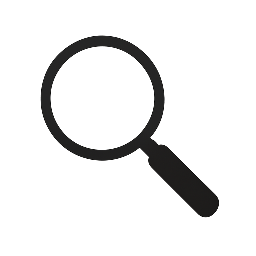
Leave a Reply